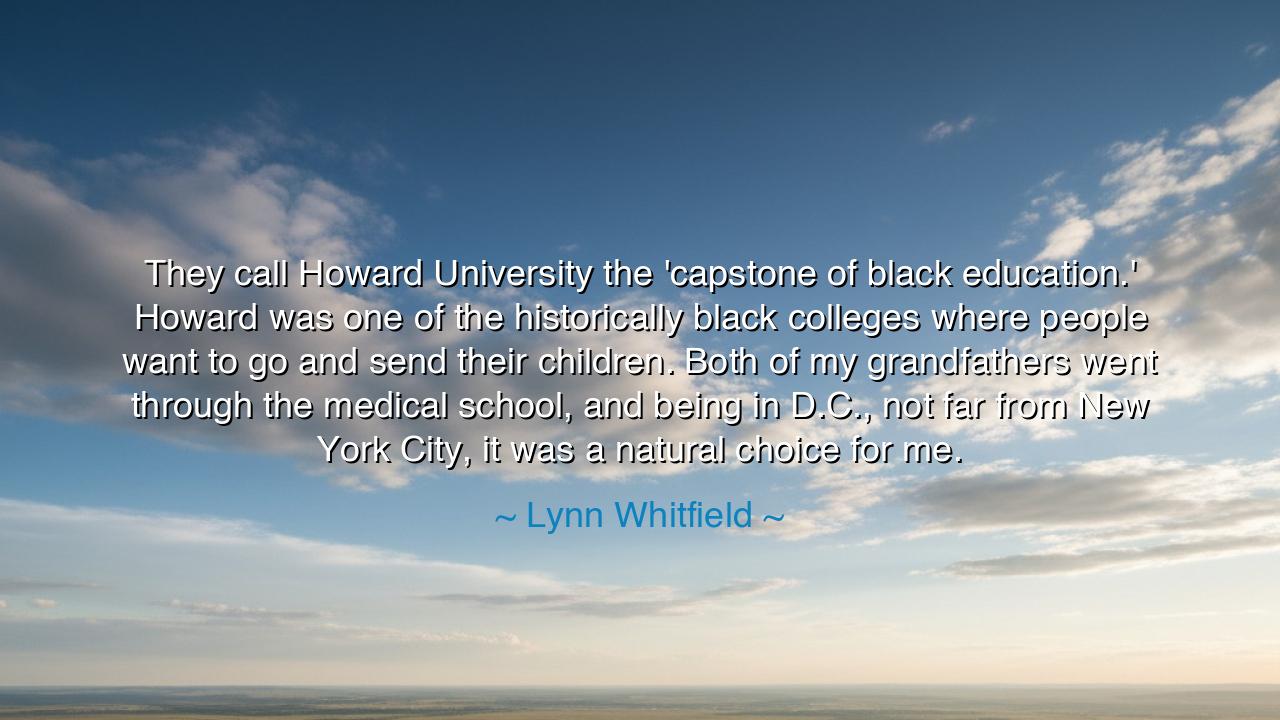
They call Howard University the 'capstone of black education.'
They call Howard University the 'capstone of black education.' Howard was one of the historically black colleges where people want to go and send their children. Both of my grandfathers went through the medical school, and being in D.C., not far from New York City, it was a natural choice for me.






The words of Lynn Whitfield—“They call Howard University the ‘capstone of black education.’ Howard was one of the historically black colleges where people want to go and send their children. Both of my grandfathers went through the medical school, and being in D.C., not far from New York City, it was a natural choice for me.”—resound with the dignity of heritage and the power of legacy. They are not merely a remembrance of one woman’s path, but a declaration of the sacred role of education, of family lineage, and of the institutions that serve as fortresses of hope for oppressed peoples. These words remind us that schools like Howard University are not only places of study, but monuments carved from struggle, endurance, and the dream of freedom through knowledge.
In calling Howard the “capstone of black education,” Whitfield speaks of more than stone and campus. She evokes a crown, the highest point of achievement, the summit of a long climb. For generations who were denied learning, who were once forbidden even to read, such institutions stood as holy ground. To walk their halls was not only to seek knowledge, but to honor ancestors who had suffered so that the doors might be opened. Thus, her words carry the emotional weight of triumph, as if the very act of studying there is itself a victory over centuries of chains.
The story of Howard University is deeply rooted in history. Founded in 1867, in the ashes of the Civil War, it arose as a beacon for newly freed African Americans. At a time when the nation struggled to define freedom, Howard declared that freedom without education was incomplete. It became the training ground of doctors, lawyers, teachers, and leaders who would go forth to heal, to defend, to teach, and to lead. From Thurgood Marshall, who would one day reshape the nation’s laws, to countless healers in medicine and science, Howard has stood as a wellspring of empowerment. Whitfield’s grandfathers, who both passed through its medical school, are part of this living lineage—a reminder that every degree earned was not for self alone, but for the uplift of a people.
We see echoes of this in the tale of the great scholar W.E.B. Du Bois, who proclaimed that the “talented tenth” of African Americans, armed with education, would lead their communities to higher ground. Though Du Bois himself studied at Harvard and abroad, the spirit of his vision is embodied in schools like Howard, where entire generations were forged into instruments of progress. Whitfield’s words, then, are not only personal memory but a continuation of that larger prophecy—that through knowledge and discipline, a people could overcome what history sought to deny them.
There is in her words also the sanctity of inheritance. By recalling her grandfathers’ passage through Howard, Whitfield testifies that education is not merely the accumulation of facts, but the passing of a torch. Her choice of Howard was not random, but a fulfillment of a family destiny, linking her to those who came before. This is a lesson for all: that our choices are not isolated, but often threads in a greater tapestry woven across generations. When we honor where our ancestors have walked, we strengthen the foundation upon which those yet unborn will stand.
But beyond heritage, there is also practicality: Howard was near, accessible, a natural choice. Greatness is often not the result of grand schemes, but of decisions rooted in the ordinary and the immediate. To see the greatness of Howard not only as a symbol but as a real, practical place where families sent their children is to remember that destiny often walks in simple steps. It is not always the distant mountain but the nearby hill that we are called to climb.
The lesson for us is clear: seek institutions that honor both your heritage and your future. Choose paths that strengthen your community, not only yourself. Cherish the sacrifices of those who came before, and let their memory guide your steps. Practically, this means valuing education not as a private possession, but as a communal gift. It means supporting schools, mentors, and programs that uplift others, and remembering that each achievement is part of a larger story of liberation.
Thus, Lynn Whitfield’s words shine as both memory and prophecy: Howard University is the capstone, not only of black education, but of resilience, of heritage, of hope. To walk its halls is to carry forward the dreams of ancestors, to rise higher not only for oneself, but for one’s people. And the wisdom she leaves us is this: embrace your inheritance, honor your teachers, and let your education be not only your triumph, but your gift to the world.






AAdministratorAdministrator
Welcome, honored guests. Please leave a comment, we will respond soon